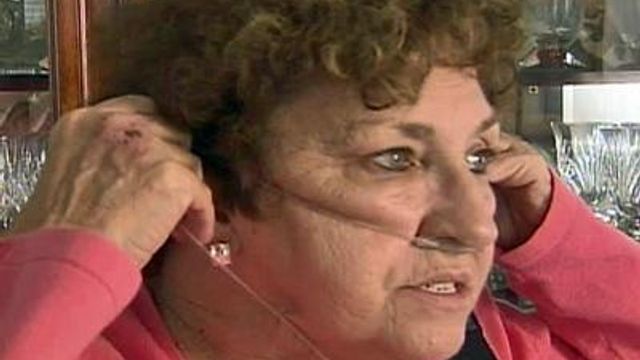Heart-care technique could help treat emphysema
Stents, used to open blocked heart arteries, might be used to bring relief to emphysema sufferers, who have trouble breathing.
Posted — UpdatedNita Powell, 61, said emphysema and a portable oxygen tank are part of the price she is paying for 45 years of smoking.
Powell said she had plenty of warning from doctors and friends, "and I kind of let it go in one ear and out the other. Kept right on smoking." She managed to quit, butnot until after she had developed emphysema.
Normally, the diaphragm contracts and draws oxygen into the lungs' 300 million tiny air sacs. As the diaphragm relaxes, carbon dioxide escapes.
With emphysema, however, the air sacs are damaged, and tiny cracks cause air to become trapped inside the lungs.
"Because that air is trapped in damaged air sacs, the lungs become over-inflated," said Dr. Momen Wahidi, a pulmonologist at Duke University Medical Center. The lungs, then, press down on the diaphragm, making breathing difficult.
In a clinical trial at Duke, Wahidi uses an airway bypass to release the trapped air. With a bronchoscope, he finds a place in the main airways, away from blood vessels, to create a hole, and then keeps that hole open with a small stent.
"By creating these passageways, hopefully, we can let that air escape and kind of deflate the lungs," Wahidi said.
That technique could make breathing easier for people like Powell and those who struggle with emphysema every day.
Available medical options for emphysema patients include various medications, but doctors say those have a minimal effect and do not help everybody. Surgery or a lung transplant are the final options, but they are high-risk procedures, with survival odds at 50/50.
"I'm just going with the hope that something will come along that I don't have to have a lung transplant," Powell said.
For more information about the clinical trial call Jane Stiles, clinical research coordinator, 919-668-3812.
• Credits
Copyright 2024 by Capitol Broadcasting Company. All rights reserved. This material may not be published, broadcast, rewritten or redistributed.





